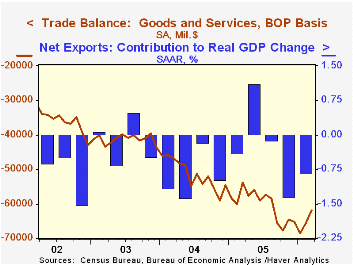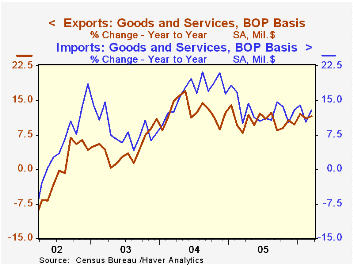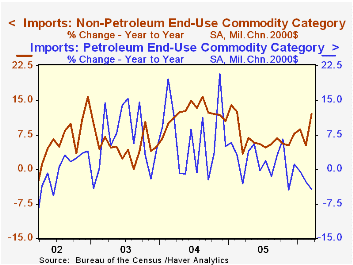 Global| May 12 2006
Global| May 12 2006U.S. Trade Deficit Lower: Exports Surged, Oil Prices Fell
by:Tom Moeller
|in:Economy in Brief
Summary
The U.S. foreign trade deficit fell to $62.0B during March, the lowest level since last August. The decline exceeded Consensus expectations for a deficit of $67.0B. Total exports recovered from the prior month's drop with a 1.9% jump [...]

The U.S. foreign trade deficit fell to $62.0B during March, the lowest level since last August. The decline exceeded Consensus expectations for a deficit of $67.0B.
Total exports recovered from the prior month's drop with a 1.9% jump led by a 1.5% (16.0% y/y) surge in capital goods exports. Exports of advanced technology products led that gain and surged 24.2% (NSA, 17.3% y/y). Nonauto consumer goods exports also were strong and rose 1.7% (12.0% y/y). Exports of industrial supplies & materials posted outsized strength with a 6.0% (18.0% y/y) increase that was offset by a 4.2% (+11.3% y/y) decline in automotive exports.
Imports contracted by 0.8% during March, pulled down by an 8.3% (+21.0% y/y) drop in petroleum imports. That seasonally adjusted decline reflected a 7.4% (-4.1% y/y) rise in the quantity of crude oil imports and 5.1% rise in the quantity of all energy-related petroleum product imports. Crude oil prices dropped 2.7% (+27.0% y/y) to an average $52.26 per bbl. Brent crude oil prices have since risen to an average $71.49 per barrel this month from an average $69.51 in April and $61.71 during March.
Imports of capital goods reversed a February decline with a 4.5% (15.1% y/y) increase. Imports of advanced technology products jumped 27.9% (NSA, 20.9% y/y) while nonauto consumer goods imports rose 2.5% (13.0% y/y).
The US trade deficit with China deepened to $15.6B ($201.6B for 2005) and the trade deficit with Japan rose to $7.6B ($82.7B in 2005). The trade deficit with the Asian NICs halved again versus February to $0.5B ($15.9B in 2005). The deficit with the European Union deepened sharply to $10.1B ($122.4B in 2005) after four months of narrowing.
Racing To The Top: How Global Competition Disciplines Public Policy from the Federal Reserve Bank of Dallas can be found here.
| Foreign Trade | Mar | Feb | Y/Y | 2005 | 2004 | 2003 |
|---|---|---|---|---|---|---|
| Trade Deficit | $62.0B | $65.5B | $53.7B (3/05) | $723.6B | $617.6B | $494.8B |
| Exports - Goods & Services | 1.9% | -1.6% | 11.6% | 10.5% | 12.6% | 4.6% |
| Imports - Goods & Services | -0.8% | -2.6% | 12.9% | 12.8% | 16.6% | 8.5% |
Tom Moeller
AuthorMore in Author Profile »Prior to joining Haver Analytics in 2000, Mr. Moeller worked as the Economist at Chancellor Capital Management from 1985 to 1999. There, he developed comprehensive economic forecasts and interpreted economic data for equity and fixed income portfolio managers. Also at Chancellor, Mr. Moeller worked as an equity analyst and was responsible for researching and rating companies in the economically sensitive automobile and housing industries for investment in Chancellor’s equity portfolio. Prior to joining Chancellor, Mr. Moeller was an Economist at Citibank from 1979 to 1984. He also analyzed pricing behavior in the metals industry for the Council on Wage and Price Stability in Washington, D.C. In 1999, Mr. Moeller received the award for most accurate forecast from the Forecasters' Club of New York. From 1990 to 1992 he was President of the New York Association for Business Economists. Mr. Moeller earned an M.B.A. in Finance from Fordham University, where he graduated in 1987. He holds a Bachelor of Arts in Economics from George Washington University.
More Economy in Brief
 Global| Feb 05 2026
Global| Feb 05 2026Charts of the Week: Balanced Policy, Resilient Data and AI Narratives
by:Andrew Cates






